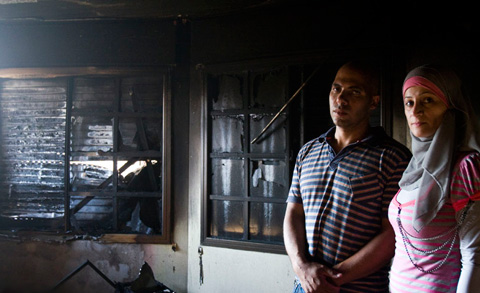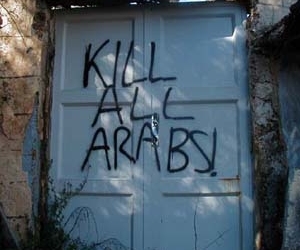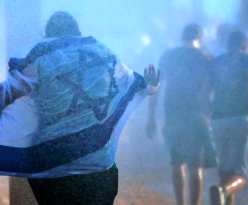Ik volg de rellen in Akko, tussen de daar wonende Palestijnen en de joodse Israeli’s in de kranten. Volgens het verhaal begonnen ze toen een Palestijn zijn dochter op ging halen en op Yom Kippur, wanneer orthodoxe joden niet rijden, door de wijk heen reed, en werd aangevallen. Hoewel hij zijn excuses aan heeft geboden was hij het die werd gearresteerd. Sindsdien zijn er joodse aanvallen geweest op huizen van Palestijnen, die ook in de Israelische kranten als ‘pogroms’ worden aangeduid, maar zijn er ook groepen Palestijnse jongeren die met stenen hebben gegooid, ruiten insloegen en auto’s vernielden.
Over de achtergrond van de rellen krijgen we hier niet veel te horen. Die ligt er uiteraard in dat Palestijnen die in Israël wonen, daar hardnekkig Arabische Israëli’s genoemd, al lang gezien werden als een potentiële vijfde colonne, als vijandige groep, en er steeds openlijker over gepraat wordt om die maar te deporteren naar de bezette gebieden – in het NRC werd dat braaf ‘verplaatsing’ genoemd, wat in feite gewoon neer zou komen op etnische zuivering. Het opvallende is dat de Palestijnen in Israel zelf tot op heden geweldloos voor hun rechten op zijn gekomen, zelfs toen in 2000 bij een demonstratie 13 jongeren door Israelische scherpschutters van het leger werden doodgeschoten. Waar overigens nooit iemand voor is bestraft.
De vraag is, nu ultra-rechts steeds gewelddadiger wordt, en het niet meer laat bij slogans als ‘dood aan de Arabieren’, en het leger niet in staat is, of niet bereid is, om hen in bedwang te houden, hoelang het nog geweldloos kan. Eigenlijk is het een wonder dat er niet al veel eerder rellen zijn uitgebarsten in die paar steden als Akko waar een aanzienlijke minderheid aan Palestijnen leeft naast de joden.
Op de foto: een echtpaar naast hun afgebrande huis.
Hieronder, voor wie engels leest, een artikel van Electronic Intifada dat anders dan de Nederlandse kranten meer in gaat op de achtergrond.
Israel’s democratic facade erodes
Ziyaad Lunat, The Electronic Intifada, 14 October 2008
A Palestinian home torched during the Acre riots. (Oren Ziv/Activestills.org)
Recent riots in the Israeli town of Acre have attracted unwanted attention towards its Arab residents, Palestinian citizens of Israel who make a third of the city’s population. The disturbances began after Jewish extremists attacked a Palestinian man for driving during the religious holiday of Yom Kippur, when traffic in Israel largely comes to a halt. This was followed by an outbreak of violence during which Jewish mobs attacked the Palestinian neighborhood in Acre’s old city, throwing stones and torching homes.
These events have been interpreted by mainstream media as an aberration in Israel’s model “democracy.” The BBC echoed official Israeli discourse, emphasizing that the so-called “Israeli-Arabs” “have full rights as Israeli citizens.” Meanwhile, outgoing Israeli Prime Minister Ehud Olmert called Acre “a shining example of co-existence.” However, the latest disturbances have brought to the fore a deeper issue: the ethnic cleansing of the Palestinians from inside Israel by Israeli Jewish extremists. According to Israeli journalist Gideon Levy, the violence at Acre was reminiscent of Bosnia, with mobs dehumanizing and inciting hatred against the Palestinians.
Historically, the Zionist state has been in the forefront of the efforts to suppress its Palestinian citizens, through a complex legal framework that circumspectly discriminates against them, but allows for Israel to sustain a “democratic” facade. One example of state discrimination is Israel’s policy of expropriating land from Palestinians and reserving it for “the Jewish people in perpetuity” and allowing the Jewish National Fund to administer these properties. This is matched by a separate, but related, policy of house demolitions linked to severe restriction on building permits that are designed to contain Palestinian urban growth within Israel. Therefore, the state has acted as a guarantor of the fragile and often contradictory relationship between democratic values and Zionist’s racial doctrine.
Israel provides political representation for its Palestinian citizens, as well as other social and economic rights, but only to the extent of their submissive acceptance of Jewish domination of the public sphere. This means that only the Zionist establishment can dictate the rules of the game for which the Palestinians are allowed to maintain their citizenship rights. In turn, the Israeli state displays its Palestinian citizens as a token of its democratic principles and practices to the rest of the world.
In spite of these measures, Palestinian citizens of Israel have progressively consolidated their capacity for political mobilization and have demanded equal rights under the banner of “a state for all its citizens.” There has also been a growing recognition of their common faith with their Palestinian brethren in the occupied West Bank and Gaza Strip. This connection was evident in October 2000, when Israeli security forces killed 13 of its own Palestinian citizens who were protesting in solidarity with Palestinians under occupation in the first month of the second Palestinian intifada.
As a result, the Zionist state found itself having to deal with a “Palestinian problem” in the occupied territories and it became increasingly anxious about the “demographic threat” that its own Palestinian citizens came to represent. Israeli politicians on the left and right of the political spectrum have tried to devise solutions to contain the growing political and demographic strength of its Palestinian citizens. Some have advocated the “transfer” of the Palestinian citizens residing close to the internationally-recognized armistice line marking the boundary between Israel and the West Bank as part of a land swap with the Palestinian Authority in final status negotiations. Tzipi Livni, the prime minister delegate, argued that a Palestinian state would also provide a national solution for the Palestinian citizens of the Jewish state, hinting that they should voluntarily move to the Bantustans if unhappy with the Jewish state. More recently, there were proposals for a national service program as a means to compel Arab loyalty to the state.
The Zionist state however, in its efforts to maintain international legitimacy, has been incapable of devising a radical “final solution” for its Palestinian citizens, mirroring the ethnic cleansing of 1948, which would appease an increasingly impatient electorate. Jewish Israelis have progressively shifted their views to the far right and are increasingly prone to hold extremist views. A 2007 poll by the Association for Civil Rights in Israel shows that half of Jewish Israelis want their government to encourage Jewish emigration from Israel and 75 percent of Jewish youths said Arabs are less intelligent and clean than Jews. These results echo other similar surveys that indicate widespread racism within Jewish Israeli society and these voices have been growing inside government, too.
Extremist elements inside Israel have thus successfully mobilized to bypass the state and take matters into their own hands, for the state is increasingly seen as incapable of silencing Palestinian demands for full equality. The settler movement, long known for operating in this manner, have pioneered this model in the occupied territories. A settler pogrom on the village Asira al-Qabaliya last month alarmed the Israeli establishment by openly demonstrating its inability to control its most extremist citizens. This rift has now crossed into Israel, signaling a new struggle.
Last month, Professor Ze’ev Sternhell, a member of Peace Now, was the victim of an ideologically-motivated bomb attack by Zionist extremists who oppose any governmental “concessions” with the Palestinians in the occupied territories. Not only are the latest mob riots in Acre an expression of a deeply-rooted antagonism towards the Palestinian citizens of Israel, but they also signify a shift within Israeli society, where Zionist zealots bypass the state to articulate their supremacist ideology.
Thus, the Israeli establishment now has to deal with its own intra-communal conflict. Since its creation, Israel has tried to reconcile its image as a “democracy” with the Jewish exclusivist ideology of Zionism and must now contend with its own extremists, who do will not hesitate to wage war against the state in order to further redeem the land of “greater” Israel for an exclusively Jewish population. This rift is slowly disintegrating Israel’s facade of co-existence and it is only a matter of time before Israel’s internal contradictions are laid bare to the eyes of the world.
Ziyaad Lunat is a long-term activist for Palestinian rights. He is currently on the organizing committee of the Nakba60-London, to commemorate the 60th anniversary of Palestinian dispossession and on the coordinating committee of Emory Advocates for Justice in Palestine, in Atlanta. He can be reached at z.lunat A T gmail D O T com.




En nog een goed artikel van Akiva Eldar, hier.
En van Gideon Levy, hier.
En een Palestijns artikel, hier.
ik ben bezig met een klein achtergrond artikel, het komt eraan
Is goed Trees, jij zit daar (letterlijk) heel dicht bij.
Anja, wat een ontzettend prachtige foto die eerste!
Hoi Irene,
Ja dramatisch simpel. Deze heb ik toevallig nu eens niet gemaakt, hoor.
Groetjes
Hier nog een goed artikel, over waarom de clashes in Akko geen uitzondering zullen blijven, hier